新概念英语第一册 第55课笔记
新概念英语第一册第55-56课-The Sawyer family
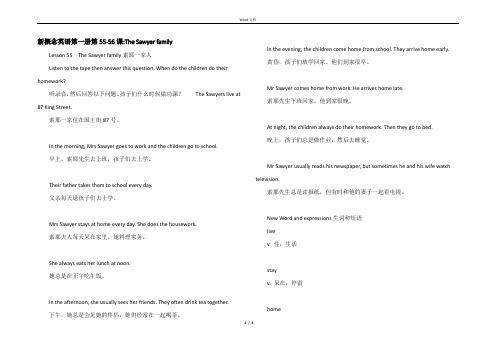
新概念英语第一册第55-56课:The Sawyer familyLesson 55 The Sawyer family索耶一家人Listen to the tape then answer this question. When do the children do their homework?听录音,然后回答以下问题。
孩子们什么时候做功课?The Sawyers live at 87 King Street.索耶一家住在国王街87号。
In the morning, Mrs Sawyer goes to work and the children go to school.早上,索耶先生去上班,孩子们去上学。
Their father takes them to school every day.父亲每天送孩子们去上学。
Mrs Sawyer stays at home every day. She does the housework.索耶夫人每天呆在家里。
她料理家务。
She always eats her lunch at noon.她总是在正午吃午饭。
In the afternoon, she usually sees her friends. They often drink tea together.下午,她总是会见她的伴侣。
她们经常在一起喝茶。
In the evening, the children come home from school. They arrive home early.黄昏,孩子们放学回家。
他们到家很早。
Mr Sawyer comes home from work. He arrives home late.索耶先生下班回家。
他到家很晚。
At night, the children always do their homework. Then they go to bed.晚上,孩子们总是做作业,然后去睡觉。
新概念英语第一册 Lesson 55 知识点讲解讲义

LESSON 55【场景演练】生病看医生,怎么办?(2)(请结合第一册课本第62 课内容参考学习)【单词银行】1.medicine n.(吞服或液体的)药物中国传统医药,简称:中药:traditional Chinese medicinePlease take this medicine and stay in bed for 5 hours.另外,medicine 做不可数名词,指医学,疗法I am studying medicine.在英语的名词中,如果:身体的部位+ ache (疼、痛)= ...疼或痛头部head + ache = headache 头痛牙齿tooth + ache = toothache 牙痛脊背back + ache = backache 背痛耳朵ear + ache = earache 耳朵痛胃部stomach + ache = stomach ache 胃痛2.dentist n. 牙医注意词根词缀“-ist”,从事某种职业的人形容词dental 牙齿的,牙科的dentist 牙医【场景演练】生病看医生,怎么办?(2)艺术家art + ist = artist小说家novel (名词,小说)+ ist = novelist旅行家tour + ist = tourist钢琴家pian (o) + ist = pianist [ˈpɪənɪst]3.temperature ['temprətʃə(r)]n. 温度场景一:指气温The temperature is very high today.低的low场景二:体温His temperature is rising.She is running a temperature. 她正在发烧。
He has a temperature.I am going to take your child’s temperature.场景三:room temperature 室温(不冷也不热)You can eat this dish at room temperature.【经典句型】请熟悉如下的病情及方式描述:【场景演练】生病看医生,怎么办?(2)Tom has an earache. So he feels very bad.Lily drinks some cold water, so she has a stomach ache.His dad has flu, not bird flu.Her mum has a toothache and she can’t sleep in the night.Ricky has a headache, because this problem is a headache for him.Lucy has measles. Don’t talk with her please.Jimmy has mumps, so he looks very terrible.在以上的病症中,flu, mumps, measles, bird flu 都是不可数名词或词组,均有传染性,请注意,它们是否有冠词?而与ache 有关的痛,都是具体的某个部位的,请再观察是否有冠词?【场景补充】在国外看病,一般都需要提前预约。
裕兴新概念英语第一册笔记:Lessons55TheSawyerfamily

裕兴新概念英语第一册笔记:Lessons55TheSawyerfamilyLessons 55 The Sawyer familyNew words and expressions:live v.住,生活stay v. 呆在,停留home n. 家; adv.在家,到家housework n. 家务lunch n.午饭afternoon n.下午usually adv. 通常together adv. 一起evening n.晚上arrive v.到达night n.夜间live v.住,生活eg. Where do you live?你住在哪里?live in……后面接国家名称或城市名称eg. I live in England.eg. She lives in Shanghai.live at……后面接确切的地址eg. John lives at 66 King Street.stay v. 呆在,停留stay at home 呆在家里eg.My husband goes to work. I stay at home and look after the children.stay in 呆在家里不出去(尤其晚上呆在家里)eg. They always go out to the club at night, but I stay in and watch TV.stay with sb 和某人呆在一起eg. She stays with her children every night.eg. I like to stay with you.stay 是指临时,短时间居住。
stay at a hotel 住旅店stay at sb's house 住在别人的家live是指长久的居住,住在自己的家中eg. I live in an apartment. 我住在公寓里。
eg. I live in a house.home1) n.家eg. Welcome to my home.eg.My home is in Harbin.at home 在家eg. She always stays at home on weekends. make oneself at home 请随便一点,放松一点eg. Make yourself at home. 请随便一点。
新概念英语第一册第55课
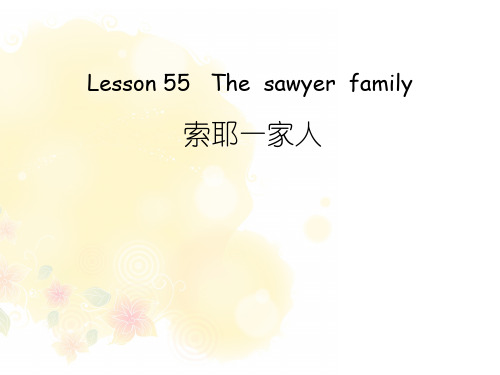
In the evening,(在傍晚) the children come home from school. 孩子们放学回家 They arrive home early .副词修饰动词) 他们到家很早 Mr. Sawyer comes home from work. 索耶先生下班回家. He arrives home late. (副词修饰动词) 他到家很晚
arrive in France
到达酒店 arrive at the hotel
到家
arrive home
He always does his homework all night.
Text The Sawyers live at 87 King :
Street. the+姓氏+s,, at+地址时,在具 表示某某一家人。体的门牌号,在 the Wangs 城市或者街名前 王先生一家人 要用in In the morning, Mr. Sawyer goes to work (上班)and the children go to school.(上学) Their father takes them to school every day. 把某人带到某地 take sb to sp My mother often takes me to the park,
At night, (晚上) the children always do their homework 孩子们总是做作业 (do one's形物代 homework) Then they go to bed. 然后去睡觉。 Mr. Sawyer usually reads his newspaper。 索耶先生总是读报纸。 可数 read a newspaper 读一张报纸 but sometimes he and his wife watch TV. 但有时和他的妻子一起看电视。
新概念第一册词汇语法第55课:The Sawyer family索耶一家人
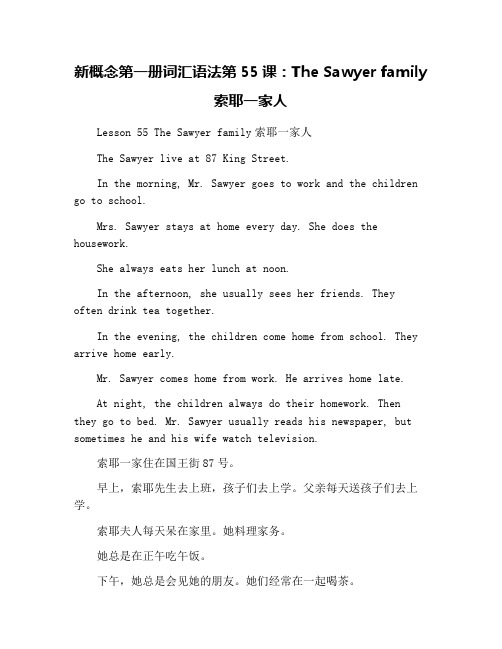
新概念第一册词汇语法第55课:The Sawyer family索耶一家人Lesson 55 The Sawyer family索耶一家人The Sawyer live at 87 King Street.In the morning, Mr. Sawyer goes to work and the children go to school.Mrs. Sawyer stays at home every day. She does the housework.She always eats her lunch at noon.In the afternoon, she usually sees her friends. They often drink tea together.In the evening, the children come home from school. They arrive home early.Mr. Sawyer comes home from work. He arrives home late.At night, the children always do their homework. Then they go to bed. Mr. Sawyer usually reads his newspaper, but sometimes he and his wife watch television.索耶一家住在国王街87号。
早上,索耶先生去上班,孩子们去上学。
父亲每天送孩子们去上学。
索耶夫人每天呆在家里。
她料理家务。
她总是在正午吃午饭。
下午,她总是会见她的朋友。
她们经常在一起喝茶。
傍晚,孩子们放学回家。
他们到家很早。
索耶先生下班回家。
他到家很晚。
晚上,孩子们总是做作业,然后去睡觉。
索耶先生总是读报纸,但有时和他的妻子一起看电视。
1.go to work, 上班。
新概念英语第一册第55课笔记

新概念英语第一册第55课1.the +姓(复数)表示一家人2.the Sawyer family=the Sawyers索耶一家3.the Black family=the Blacks布莱克一家4.live in 居住在+大地点5.live at 居住在+小地点6.go to work 去上班7.go to school去上学8.go to bed 去睡觉9.go home 回家10.take ———to —--带---去——-11.stay in/at 呆在(大/小)12.do the homework/housework做作业/做家务13.at noon在中午14.see sb看望某人15.drink tea=have tea喝茶16.eat lunch=have lunch吃午饭e home from work下班回家e home from school放学回家19.after school放学20.after class下课21.after work下班22.arrive in/at到达(大/小)23.arrive home(省略介词) 到家24.at night在夜晚25.at noon在正午(中午12:00)26.at midnight在午夜(半夜12:00)27.read newspapers读报纸测试:1.表示一家人(两种表示)2.索耶一家(两个短语)3.布莱克一家(两个短语)4.居住在+大地点5.居住在+小地点6.去上班7.去上学8.去睡觉9.回家10.带--—去--—11.呆在(大/小)12.做作业/做家务13.在中午14.看望某人15.喝茶16.吃午饭17.下班回家18.放学回家19.放学20.下课21.下班22.到达(大/小)23.到家24.在夜晚25.在正午(中午12:00)26.在午夜(半夜12:00)27.读报纸。
新概念英语第一册自学笔记含课后练习答案:Lesson55-56
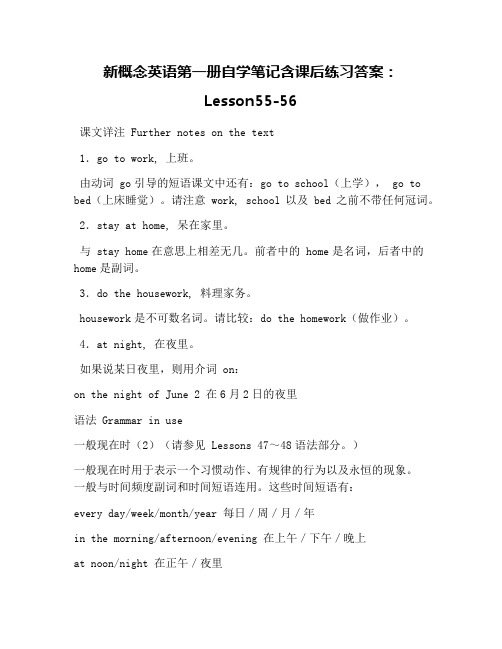
新概念英语第一册自学笔记含课后练习答案:Lesson55-56课文详注 Further notes on the text1.go to work, 上班。
由动词 go引导的短语课文中还有:go to school(上学), go to bed(上床睡觉)。
请注意 work, school以及 bed之前不带任何冠词。
2.stay at home, 呆在家里。
与 stay home在意思上相差无几。
前者中的 home是名词,后者中的home是副词。
3.do the housework, 料理家务。
housework是不可数名词。
请比较:do the homework(做作业)。
4.at night, 在夜里。
如果说某日夜里,则用介词 on:on the night of June 2 在6月2日的夜里语法 Grammar in use一般现在时(2)(请参见 Lessons 47~48语法部分。
)一般现在时用于表示一个习惯动作、有规律的行为以及永恒的现象。
一般与时间频度副词和时间短语连用。
这些时间短语有:every day/week/month/year 每日/周/月/年in the morning/afternoon/evening 在上午/下午/晚上at noon/night 在正午/夜里第3人称单数的谓语动词需加以变位,这可分为几种情况:(1)直接加 -s,如:come----comesarrive----arrives(2)以 -sh, -ch, -o 以及 -s结尾的动词加 -es,如:wash----washesgo----goeswatch----watchesdo----does(3)以辅音加 -y结尾的动词,把 -y改成 -i,再加 -es;而元音加-y结尾的动词,只加 -s即可:hurry----hurriescarry----carriesplay----playsstay----stays词汇学习 Word study1.arrive v.(1)到达;到来:We arrived home early. 我们很早就到家了。
新概念英语第一册Lesson55-56笔记(语法点+配套练习+答案)
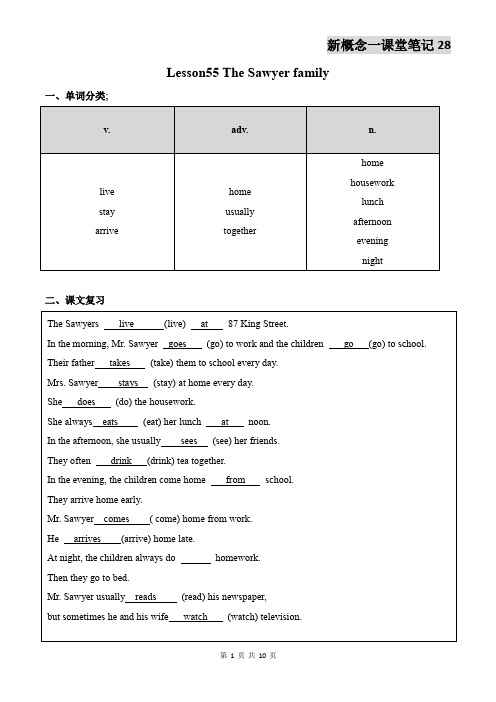
nightn.夜间
atnight在晚上
atnoon在中午
The koala sleepsinthe day and movesatnight.
I don’t go homeatnoon.
The Sawyer family
live at +小地点
living thing生物
living way生活方式
life n.生活,生命
I liveat58 Huanghe Road.
He livesinEngland.
The old man likes livinginthe country.
Different people have their differentliving ways .
The baby like stayingwithits mother.
Get up! Don’t stayinbed.
home
n.家
adv.在家,到家
at home在家
stay at home呆在家
go home回家
arrive home到家
I have a beautifulhomein Zhangzhou.(n.)
看电视
at noon
在中午
make the bed
铺床
in the afternoon
在下午
wash the dishes
刷盘子
at night
在晚上
type a letter
打信
5、语法解析
1.一般现在时
定义:1.(fact)客观事实或客观真理
新概念英语第一册课文翻译及学习笔记Lesson51~56
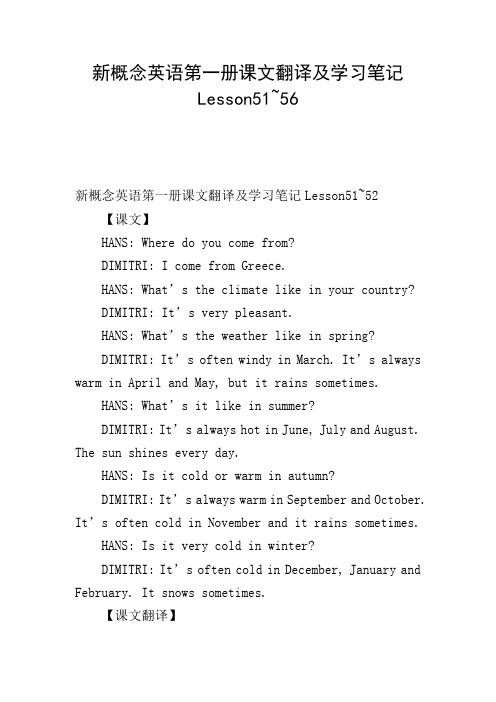
新概念英语第一册课文翻译及学习笔记Lesson51~56新概念英语第一册课文翻译及学习笔记Lesson51~52 【课文】HANS: Where do you come from?DIMITRI: I come from Greece.HANS: What’s the climate like in your country?DIMITRI: It’s very pleasant.HANS: What’s the weather like in spring?DIMITRI: It’s often windy in March. It’s always warm in April and May, but it rains sometimes.HANS: What’s it like in summer?DIMITRI: It’s always hot in June, July and August. The sun shines every day.HANS: Is it cold or warm in autumn?DIMITRI: It’s always warm in September and October. It’s often cold in November and it rains sometimes.HANS: Is it very cold in winter?DIMITRI: It’s often cold in December, January and February. It snows sometimes.【课文翻译】汉斯:你是哪国人?迪米特里:我是希腊人。
汉斯:你们的国家的气候是怎么样?迪米特里:气候非常宜人。
汉斯:春季的天气怎么样?迪米特里:3月里常常刮风。
4月和5月的天气总暖洋洋的,但有时下雨。
汉斯:夏季的天气如何呢?迪米特里:6月、7月和8月的天气总是炎热的每天都出太阳。
新概念第一册第55课_2022年学习资料
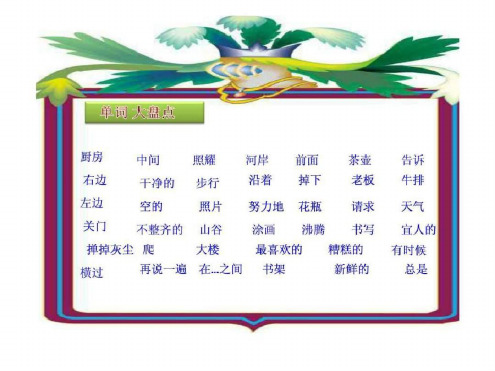
改成否定句don't/doesn't,-疑问句Do/Does-Cmev袋-1.The Sawyers li e at 87 King Street.-2.Mr.Sawyer goes to work.'-3.The children go to school.-5.She eats her lunch at noon..She usually sees her friends.-7.They ar-rive home ea ly.-8.They go to bed.-9.Mr.Sawyer reads his newspaper
0-Lesson55 The Sawyer family
Байду номын сангаас
Words:-Iive:住,生活(是个不及物动词)-live in:用于街道,城市前-live at:用于 体的门牌号前-stay:呆在,停留-stay at home是名词-stay home是副词
lunch:中餐-breakfast-早餐-dinner/supper-晚餐-用餐have/eat-bre kfast/lunch/dinner/supper-afternoon下午-在某日的夜里用介词on-eve ing-夜间-the morning-the afternoon-the evening-night
☆-冷-综-How many people are there in your family-What d es your mother do?-What does your father do?-When do our family get up?-Wht do your mother father you do i the-momin/afteoonvenng
新概念英语第一册55-56课详解

新概念英语第一册55-56课详解Lesson 55-56 of New Concept English Book 1 Detailed Explanation.Lesson 55: The Sawyer Family.Vocabulary and Expressions:live [lɪv] v.: This verb has multiple meanings. Firstly, it can mean to reside or habitually inhabit a place. For example, "I live in Hefei." Secondly, it can mean to exist or be alive, as in "People cannot live without air." Lastly, it can be used in the expression "live a/an... life" to describe the way someone lives their life.stay [steɪ] v.: This Verb primarily means to remain in a place for a period of time. It can also be used figuratively to mean "remain" in a certain state or condition, as in "stay hungry, stay foolish."home [həʊm] n./adv.: As a noun, it refers to the place where one lives. As an adverb, it means "to the place where one lives," as in "go home."housework ['haʊswɜːk] n.: This noun refers to the tasks related to maintaining a household, such as cleaning, cooking, and laundry.lunch [lʌnʃ] n.: This noun refers to the meal eaten in the middle of the day.afternoon [ɑːftə'nuːn] n.: This noun refers to the period of time between noon and evening.Text Explanation:Lesson 55 introduces the Sawyer family and their daily routine. The lesson begins by introducing the family members and their occupations. Mr. Sawyer works in an office, while Mrs. Sawyer stays at home. The children go to school. The lesson then goes on to describe their eveningactivities. Mr. Sawyer usually arrives home from work at about five o'clock, and the family then has their lunch together. In the afternoon, they often have a rest, andthen in the evening, they usually stay at home and watch television.Grammar Points:The use of "-s" or "-es" to form the third-person singular present tense of verbs is reinforced in this lesson. For example, "Mr. Sawyer usually arrives home from work at about five o'clock."The use of prepositions with "live" is also introduced. For example, "Mr. Sawyer lives in a town near London,"where "in" is used with a large place, and "Mrs. Sawyerlives at 87 King Street," where "at" is used with aspecific address.Lesson 56: What Do They Do?Vocabulary and Expressions:together [tə'geðə] adv.: This adverb means "in a group" or "side by side."evening ['iːvnɪŋ] n.: This noun refers to the time of day that comes after afternoon and before night.arrive [ə'raɪv] v.: This Verb means to reach a destination after a journey.night [naɪt] n.: This noun refers to the period of time from sunset to sunrise.Text Explanation:Lesson 56 continues the theme of the Sawyer family's daily life by asking the question, "What do they do?" The lesson provides information about the family's evening activities. Mr. Sawyer usually arrives home from work at about five o'clock, and then the family has their tea together. After tea, they usually sit in the living room and watch television. Sometimes, they go to the cinema orto the theater. On Sundays, they often go for a walk in the park.Grammar Points:The present tense of verbs is reinforced in this lesson, particularly the use of the third-person singular form.The lesson also introduces the use of modal verbs such as "can" and "usually" to express ability and frequency.Conclusion:Lessons 55 and 56 of New Concept English Book 1 focus on the Sawyer family's daily routine and activities. These lessons introduce new vocabulary and expressions related to family life, daily activities, and grammar points such as the use of "-s" or "-es" in the third-person singular present tense and the use of modal verbs. By learning these lessons, students can improve their understanding of family life in English-speaking countries and enhance theirlanguage skills in areas such as vocabulary, grammar, and comprehension.。
新概念课堂笔记 第一册 Lesson 55-56-教育文档
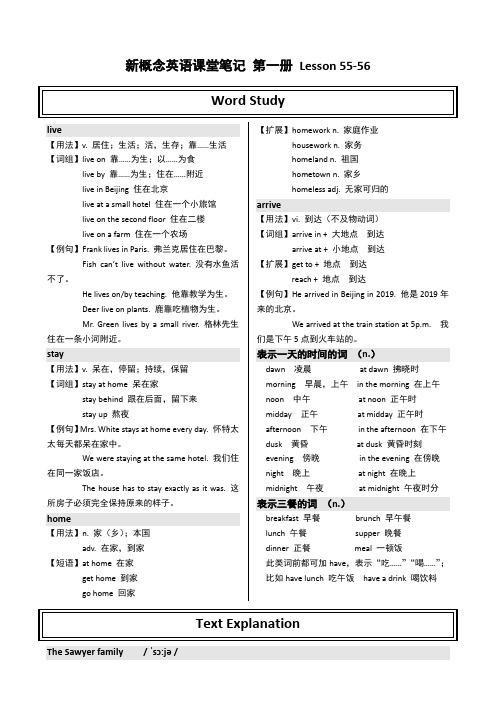
新概念英语课堂笔记第一册Lesson 55-56live【用法】v. 居住;生活;活,生存;靠……生活【词组】live on 靠……为生;以……为食live by 靠……为生;住在……附近live in Beijing 住在北京live at a small hotel 住在一个小旅馆live on the second floor 住在二楼live on a farm 住在一个农场【例句】Frank lives in Paris. 弗兰克居住在巴黎。
Fish can’t live without water. 没有水鱼活不了。
He lives on/by teaching. 他靠教学为生。
Deer live on plants. 鹿靠吃植物为生。
Mr. Green lives by a small river. 格林先生住在一条小河附近。
stay【用法】v. 呆在,停留;持续,保留【词组】stay at home 呆在家stay behind 跟在后面,留下来stay up 熬夜【例句】Mrs. White stays at home every day. 怀特太太每天都呆在家中。
We were staying at the same hotel. 我们住在同一家饭店。
The house has to stay exactly as it was. 这所房子必须完全保持原来的样子。
home【用法】n. 家(乡);本国adv. 在家,到家【短语】at home 在家get home 到家go home 回家【扩展】homework n. 家庭作业housework n. 家务homeland n. 祖国hometown n. 家乡homeless adj. 无家可归的arrive【用法】vi. 到达(不及物动词)【词组】arrive in + 大地点到达arrive at + 小地点到达【扩展】get to + 地点到达reach + 地点到达【例句】He arrived in Beijing in 2019. 他是2019年来的北京。
新概念英语一55课学习笔记

LESSON 55课文:课前造句1. 在周末at (on )the weekend每逢周末on weekends每逢工作日on weekdays (周一——周五)每逢星期天,我常常帮母亲做家务。
I often help my mother to do some homework at home on Sundays.2. 让我们一起去购物。
Let’s go shopping together.3.每天早晨我通常七点钟到校。
I usually get (reach ,arrive)to school at 7 o’olock in the morning.4. 晚上和我一起吃饭好吗?Would you like to have supper with me in the tonight?5. 你什么时候做作业?What time (when)often do your homework?6. 星期天我常常呆在家里。
I often stay at home on Sundays.7.你住在那里?我住在新房子。
Where do you live ? I live in the new building.课文:1.The + 姓的复数,谓语动词要用复数。
表示一家人如The Greens(格林一家)The Smiths(史密斯一家)后面的谓语动词都要用复数The Blacks(布来克一家)The Greens are watching TV.格林一家正在看电视。
The Smiths are having dinner. 史密斯一家正在吃完饭。
2.数词on the street, in the street 如果有门牌号,前面介词必须用atat+大街或大路Where do you live? I live at 50 people’s street.3.并列句用and连接的句子。
go to work上班go to school上学My parents go to work and I go to school. in the morning .每天早晨我父母去上班,我去上学。
新概念英语第一册第55课

lunch
早餐
breakfast 晚饭 supper
n.
n.
午饭
n.
吃早餐/午饭/晚饭
have breakfast/ lunch /supper
afternoon
n. 下午
morning /evening 早上/晚上 在早上/中午/晚上 In the morning/afternoon/ evening
Language points
1.the Sawyers
the + 姓氏+ s = the + 姓氏 + family
2.go to work \ school \bed \ hospital 3.take sb to sp e home from school \ work 5.arrive home early \ late 6.read a newspaper 7.watch television \ TV
home n. 家 ;adv. 住家,到家 1) n. 家 欢迎来我家 eg: Welcome to my home . 在家 at home 呆在家 stay at home 她总是呆在家 eg: She always stays at home. 2)adv. 住家,到家(副词前不能加介词) 3)回家 4)go home 到家 come home 她经常到家很晚。 eg: she always comes home late. housework n. 家务 做家务 do the housework 家庭主妇 housewife
⑧do their homework
What do\does+someone+(频率副词)+do+时间状语? 某人通常在某个时间做什么? 他们早晨通常做什么?
新概念英语第一册课文翻译及学习笔记Lesson51~56
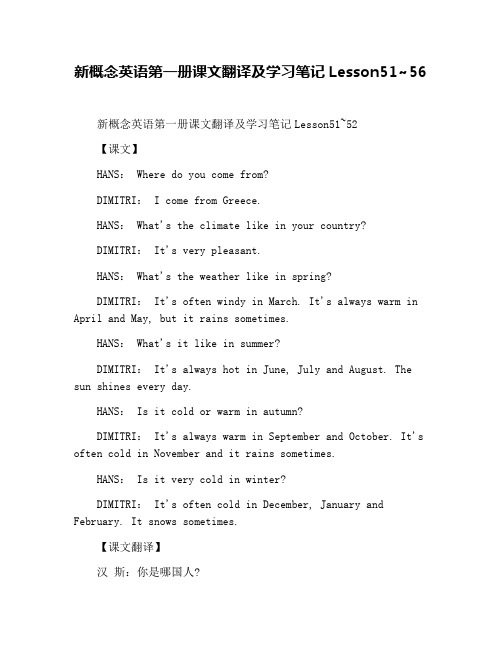
新概念英语第一册课文翻译及学习笔记Lesson51~56新概念英语第一册课文翻译及学习笔记Lesson51~52【课文】HANS: Where do you come from?DIMITRI: I come from Greece.HANS: What's the climate like in your country?DIMITRI: It's very pleasant.HANS: What's the weather like in spring?DIMITRI: It's often windy in March. It's always warm in April and May, but it rains sometimes.HANS: What's it like in summer?DIMITRI: It's always hot in June, July and August. The sun shines every day.HANS: Is it cold or warm in autumn?DIMITRI: It's always warm in September and October. It's often cold in November and it rains sometimes.HANS: Is it very cold in winter?DIMITRI: It's often cold in December, January and February. It snows sometimes.【课文翻译】汉斯:你是哪国人?迪米特里:我是希腊人。
汉斯:你们的国家的气候是怎么样?迪米特里:气候非常宜人。
汉斯:春季的天气怎么样?迪米特里:3月里常常刮风。
4月和5月的天气总暖洋洋的,但有时下雨。
新概念第一册55课
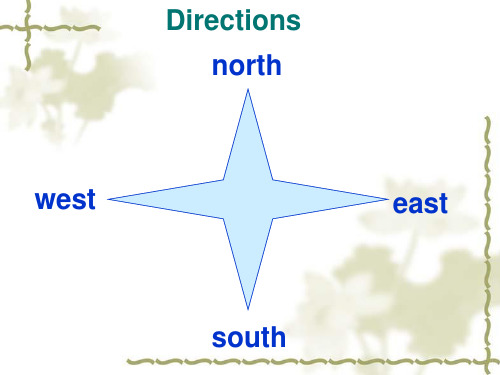
表述客观规律或事实用一般现在时
The plane can fly in the sky. The earth goes around the sun. He is tall.
Translations
1. Mr. Jones晚上经常在家看电视。 Mr. Jones always watch TV at
3.天气是我们最喜欢谈论的话题。
Weather is our favourite subject of conversation.
L54
-- Where does he come from? Is he Australian?
--Yes. He's Australian. He comes from Australia.
3
Mrs Sawyer stays at home every day. She does the housework.
4
She always eats her lunch at noon.
5
In the afternoon, she usually sees her friends. They often drink tea together.
Ask your partner
What do you usually do in the morning? in the afternoon? in the evening at night?
What do you usually do at weekend? in your vacation?
Directions north
west
east
south
翻译L53
1.广州的气候温和,但也不是很好。
- 1、下载文档前请自行甄别文档内容的完整性,平台不提供额外的编辑、内容补充、找答案等附加服务。
- 2、"仅部分预览"的文档,不可在线预览部分如存在完整性等问题,可反馈申请退款(可完整预览的文档不适用该条件!)。
- 3、如文档侵犯您的权益,请联系客服反馈,我们会尽快为您处理(人工客服工作时间:9:00-18:30)。
新概念英语第一册第55课
1.the +姓(复数) 表示一家人
2.the Sawyer family=the Sawyers索耶一家
3.the Black family=the Blacks布莱克一家
4.live in 居住在+大地点
5.live at 居住在+小地点
6.go to work 去上班
7.go to school去上学
8.go to bed 去睡觉
9.go home 回家
10.take ---to ---带---去---
11.stay in/at 呆在(大/小)
12.do the homework/housework做作业/做家务
13.at noon在中午
14.see sb看望某人
15.drink tea=have tea喝茶
16.eat lunch=have lunch吃午饭
e home from work下班回家
e home from school放学回家
19.after school放学
20.after class下课
11
21.after work下班
22.arrive in/at到达(大/小)
23.arrive home(省略介词) 到家
24.at night在夜晚
25.at noon在正午(中午12:00)
26.at midnight在午夜(半夜12:00)
27.read newspapers读报纸
测试:
1.表示一家人(两种表示)
2.索耶一家(两个短语)
3.布莱克一家(两个短语)
4.居住在+大地点
5.居住在+小地点
6.去上班
7.去上学
8.去睡觉
9.回家
10.带---去---
11.呆在(大/小)
12.做作业/做家务
13.在中午
22
14.看望某人
15.喝茶
16.吃午饭
17.下班回家
18.放学回家
19.放学
20.下课
21.下班
22.到达(大/小)
23.到家
24.在夜晚
25.在正午(中午12:00)
26.在午夜(半夜12:00)
27.读报纸
33。
